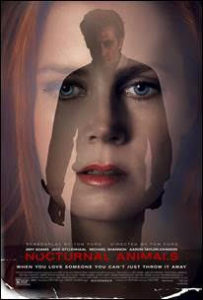 Starring: Amy Adams, Jake Gyllenhaal and Michael Shannon
Starring: Amy Adams, Jake Gyllenhaal and Michael Shannon
Directed By: Tom Ford
Rated: R
Running Time: 116 minutes
Focus Features
Our Score: 4 out of 5 Stars
“Nocturnal Animals” requires two viewings, if you can stomach it that is. Tom Ford’s vision is a messy movie, with a fuzzy meaning. But despite the juggling act, the disorderliness feels intentional. “Nocturnal Animals” is two movies for the price of one, with each tale telling and revealing more about the other. “Nocturnal Animals” delivers a slow reveal that will surely dissatisfy many, while simply turning off others in the first few minutes, but please those who hang with it and scratch beneath the surface.
Despite owning a successful LA art gallery, Susan (Adams) seems indifferent to life. She’s married to an unfaithful man, her child has left the coop and she inhabits an artificial home full of artificial art pieces. Something stirs her from her humdrum existence, her ex-husband’s novel. Edward (Gyllenhaal) has sent her a copy of his book and inquired through email about possibly meeting for dinner to catch up. The novel, “Nocturnal Animals,” is not only dedicated to her, but she tells everyone that Edward had always referred to her as a nocturnal animal.
When she flips to page one, the movie then dives into the context of the book. It begins with a family being driven off the road in rural Texas by dangerous men and turns into a husband/father trying to make sense of a horrifying night that has turned into a lifelong nightmare. The raw viciousness and violence of Edward’s book seems to startle and upset Susan. But it’s not the visceral nature of the book; it’s how much of it mirrors their old relationship.
You could almost call “Nocturnal Animals” a wonderful ensemble, featuring actors and actresses who have won or been nominated for an award, or those who certainly should. Gyllenhaal does double duty as Edward in Susan’s life and as the heartbroken, vengeful father in the book. Accompanying him and Adams are Michael Shannon, Aaron Taylor-Johnson, Armie Hammer, Ilsa Fisher, and others. The visual storying telling between the fictional book and the reality are clear, but it’s when the two begin to reflect each other metaphorically and physically, that it becomes blurry.
The neo-western style of the book story never really meshes well with the simmering thriller happening in the real world, but the dramatic and tonal shifts help break up any monotony that might creep in because on their own accord, each story isn’t stellar. It’s only interesting when both are slapped together, with similar symbols bleeding through the lines of reality. Director Tom Ford deserves all the credit in the world for keeping the wild swings in storytelling and writing in check, without derailing the movie entirely.
However, the commentary on Susan and Edward’s formal love life is suspiciously misogynistic. Understandably, Edward is the one commenting on it and Susan is the one merely reacting to his comparisons. But it offers a one-sided narrative of what once was, painting Susan in a broad and negative light. Although that could be its inherent intention, depending on how you want to view the ending to the movie, and the book within the movie, I can help but wonder about it’s reception of the roles were changed.
“Nocturnal Animals” will certainly draw comparisons to some of David Lynch’s more bizarre offerings, but Ford’s style isn’t charmingly oddball enough. It’s intentionally dark content and bizarre imagery is more likely to turn-off a regular audience than dazzle. But it’s a compelling movie to watch and delight to discuss with those who have managed to stomach it. Ford, the fashion designer turned director, is a unique talent worth keeping an eye on.

